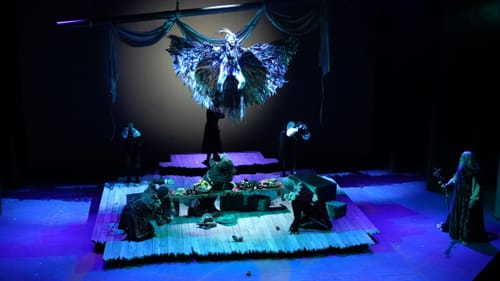Stay in the Loop
BSR publishes on a weekly schedule, with an email newsletter every Wednesday and Thursday morning. There’s no paywall, and subscribing is always free.
The formal tension of Shakespeare’s last storm
Pennsylvania Shakespeare Festival presents Shakespeare’s The Tempest

Even in the smoothest of productions, currents of unease always roil The Tempest. The opening storm strikes a thunderous chord, and as the shipwrecked crew finds its footing on a mysterious island, we encounter pockets of both high comedy and profound alienation. Is this a mirthful comic fantasy or the vengeful concoction of a wronged magician?
This formal tension animates much of Shakespeare’s late-career work, though it can sometimes bleed through to individual productions, as in the Pennsylvania Shakespeare Festival’s new staging of The Tempest, directed by Jason King Jones. While the production occasionally conjures the play’s uncanny sorcery, it often struggles to navigate its particularly heady blend of genres.
A puttering Prospero
If this Tempest is a shaky construction, we must look first to its de facto architect. The magician Prospero, portrayed by a wizened Robert Cuccioli, seeks to reclaim his rightful station as Duke of Milan, banished some 12 years prior, and summons the titular storm to set into motion the events of the play. His is certainly on tenuous moral ground: to what degree is Prospero a bitter puppeteer, enslaving the native islanders and bending fate to achieve his political ends? Yet much of the unease in this iteration seems to stem from the actor, not the character, and several scenes arrive misshapen as a result.
Take, for instance, the first encounter between Miranda (Billie Wyatt), Prospero’s daughter, and Ferdinand (John Austin), the King of Naples’s son. Prospero wishes the two to eventually marry, a long-term ploy to regain a foothold in Italy’s body politic, so he devises to play the part of the disapproving father to fuel their desire all that much more. But Cuccioli’s Prospero approaches his task with such equivocation that this aim is unclear to a first-time audience, puttering through rather than taking command of the play’s early scenes.
Lovers, creatures, revelers
The other characters in Prospero’s immediate circle are serviceably rendered but stop short of apprehending the immense strangeness that besets those on the island. Wyatt and Austin evince a believable dance of puppy love—he stammers, she swoons—but it still leaves something to be desired. For her, this should be the first young man she’s ever seen, and for him, the island and its inhabitants should be tantamount to a dream, as opposed to the motions of a mere teenage first crush.
The island spirit Ariel (an ethereal Sarah Gliko) comes closest to capturing the island’s singular nature, invisibly assisting Prospero with his myriad stratagems. Gliko’s Ariel is more divine being than earthly trickster, a register that serves the show well when she flies about the stage with balletic grace, but that sometimes falters when realizing the character’s more mischievous wiles.

These variable performances might threaten to sink this Tempest, were it not for the comedic stylings of Akeem Davis and Jim Helsinger as Trinculo and Stephano, respectively: two powerhouse displays that seem as large as the island on which they stand. The court jester and the king’s sottish butler, the two men find themselves stranded from the rest of their crew and, next to the island native Caliban (a wonderfully Gollum-esque Christopher Patrick Mullen), suddenly find themselves the highest-status members of their party. Drunk on this freedom and a seemingly endless store of wine, they careen about the stage in an electric concoction of physical comedy, musical theater, and audience interaction.
Glimmers of wonder
Like the performances, the special effects offer a mixed bag of tricks. Some fall flat, but others astound. Early evocations of Prospero’s wizardry as the sketches of an artist—visualized in projections by CJ Barnwell—appear as uninspired attempts to make use of the space’s technological capacity. They suggest an idea of Prospero as sketch artist that, though ripe, isn’t further explored. However, many of the play’s aerial displays make up for this, particularly in a stunning episode in which the lights flare and Ariel crashes down from the heavens as an unholy Angels in America–style deity, a tangible damnation to the ship’s stranded crew.
Amidst these discordant elements, Prospero ultimately ties together the play’s threads in dignified fashion. Cuccioli strikes a suitably melancholic note in his final soliloquy, a plea for the audience to set him free with their applause. In this case, it also seems an appeal to forgive the production for its coarser nature, now that everything has been put right in the end. It may have been a choppy journey, he seems to suggest, but we did catch rare glimmers of the unique wonder of which great Tempests are capable.
What, When, Where
The Tempest. By William Shakespeare, directed by Jason King Jones. Through August 6, 2023, at the Pennsylvania Shakespeare Festival’s Labuda Center for the Performing Arts, 2755 Station Avenue, Center Valley. (610) 282-WILL or pashakespeare.org.
Accessibility
The Pennsylvania Shakespeare Festival box office is able to accommodate requests for a wheelchair or companion seat, space for a service animal, a large-print program, or a headset for the assisted-listening system.
There will be an audio-described performance of The Tempest on Saturday, July 29, at 2pm.
Sign up for our newsletter
All of the week's new articles, all in one place. Sign up for the free weekly BSR newsletters, and don't miss a conversation.

 Kiran Pandey
Kiran Pandey